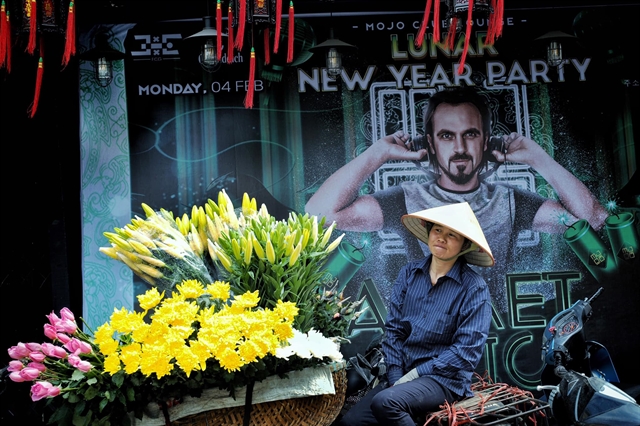 Society
Society


|
| A woman sells flowers in a street of Hà Nội.— VNS Photo Việt Thanh |
HÀ NỘI — Viêt Nam lacks comprehensive solutions to encourage migrant workers to buy voluntary social insurance, the country's top labour official has said.
Minister of Labour, Invalid and Social Affairs Đào Ngọc Dung told Vietnam News Agency in a recent interview that only 270,000 rural-to-urban migrant workers have bought voluntary social insurance, 0.8 per cent of the total 34 million migrant workers, although the Government has issued many social security policies for migrant workers.
It is also estimated that about 500,000 Vietnamese labourers work abroad, a figure which increases by about 100,000 each year. Of which, only 6,000 migrant workers have bought voluntary social insurance, Đinh Duy Hùng, deputy head of Việt Nam Social Security's Department of Collection said.
Causes
Gaps in policy implementation were to blame for the situation, Lê Thanh Sang, president of Southern Institute of Social Sciences said.
There were many barriers stopping migrant workers from buying voluntary social insurance, Sang said.
The barriers include the mechanism of social management by household registration and limitations of policy dissemination, he said.
Moving elsewhere to find work meant implementing the policies via household registration was ineffective, he added.
“Migrant workers not only lose the support of social security policies in their homeland but also have difficulties accessing the policies in their new destination,” he said.
Nguyễn Trọng Đàm, former Deputy Minister of Labour, Invalid and Social Affairs, said poor migrant workers had not benefited from social security policies in the place they migrated to because current regulations failed to mention them receiving social security benefits in the place they migrated to.
Minister Dung said the migrants' low and unstable incomes were also of concern, as are the complex administrative procedures for migrant workers to buy social insurance.
Additionally, it took up to 20 years to buy social insurance before a buyer could receive a monthly pension. This made migrant workers hesitate to buy the voluntary social insurance because they did not see the immediate benefits, Đàm added.
Trần Hải Nam, deputy head of the ministry’s Social Insurance Department, said although migrant workers were mentioned in some laws such as the law on social insurance, law on employment and the Labour Code, the number of migrant workers who had bought social insurance was still limited.
This was because of inappropriate methods of dissemination, he said.
Solutions
To tackle the problem, Nam said migrant workers should be educated on the importance of social insurance via the Youth Union, Women’s Union and Farmers Association rather than via television or radio, which they rarely have time to watch or listen to due to their long working hours.
Managerial agencies were advised to issue comprehensive solutions to fix the situation, he said.
The Government had run a policy of financial support for voluntary social insurance participants, but the support levels should be increased, he added.
Currently, a person belonging to the poor household list can receive financial support of 30 per cent from the State when they buy voluntary social insurance. The financial support will be 25 per cent for a person on the near-poor household list.
The social insurance agency should reform administrative procedures to help migrant workers, Nam said. For migrant workers who work abroad, the Government as well as social the social insurance agency should sign bilateral agreements to help them access the social security policies of the nations they moved to, he added.— VNS




